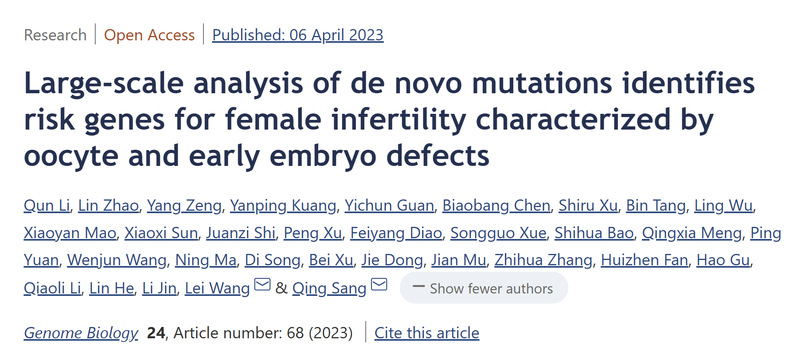Oocyte maturation arrest and early embryonic arrest are important reproductive phenotypes resulting in female infertility and cause recurrent failure of assisted reproductive technology (ART). However, the genetic etiologies of these female infertility-related phenotypes are poorly understood. Previous studies have mainly focused on inherited mutations based on large pedigrees or consanguineous patients. However, role of de novo mutations (DNMs) in these phenotypes remain to be elucidated. To decipher the role of DNMs in ART failure and female infertility with oocyte and embryo defects, we explore the landscape of DNMs in 473 infertile parent-child trios and identify a set of 481 confident DNMs distributed in 474 genes. Gene ontology analysis reveals that the identified genes with DNMs are enriched in signaling pathways associated with female reproductive processes such as meiosis, embryonic development and reproductive structure development. We perform functional assays on the effects of DNMs in a representative gene Tubulin Alpha 4a (TUBA4A), which shows the most significant enrichment of DNMs in the infertile parent-child trios. DNMs in TUBA4A disrupt the normal assembly of the microtubule network in HeLa cells, and microinjection of DNM TUBA4A cRNAs cause abnormalities in mouse oocyte maturation or embryo development, suggesting the pathogenic role of these DNMs in TUBA4A. Our findings suggest novel genetic insights that DNMs contribute to female infertility with oocyte and embryo defects. This study also provides potential genetic markers and facilitates the genetic diagnosis of recurrent ART failure and female infertility.

Title: Large-scale analysis of de novo mutations identifies risk genes for female infertility characterized by oocyte and early embryo defects
Links:https://genomebiology.biomedcentral.com/articles/10.1186/s13059-023-02894-0
©复旦大学生殖与遗传团队 All rights reserved.

 Chinese
Chinese